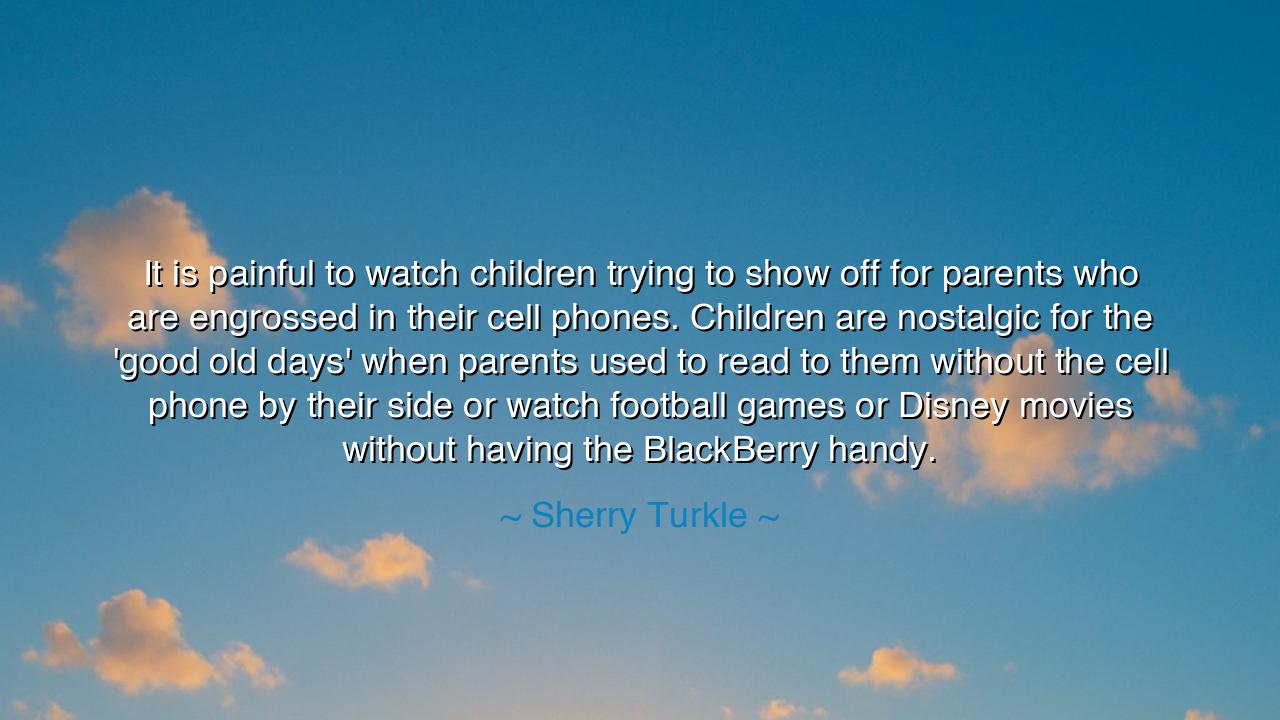
It is painful to watch children trying to show off for parents
It is painful to watch children trying to show off for parents who are engrossed in their cell phones. Children are nostalgic for the 'good old days' when parents used to read to them without the cell phone by their side or watch football games or Disney movies without having the BlackBerry handy.






Hear the lament of Sherry Turkle, scholar of the human heart in the age of machines. She declared: “It is painful to watch children trying to show off for parents who are engrossed in their cell phones. Children are nostalgic for the ‘good old days’ when parents used to read to them without the cell phone by their side or watch football games or Disney movies without having the BlackBerry handy.” In these words lies a warning as old as time: when the bond between parent and child is weakened, the very roots of humanity tremble.
When Turkle speaks of children, she calls us to remember their sacred innocence. The child looks to the parent not only for food and shelter, but for presence—for eyes that see them, ears that hear them, hearts that affirm their worth. Yet in this age, the parent’s gaze is often lowered, fixed not on the child but on the glowing cell phone. The child leaps, sings, dances, and pleads for notice, yet finds only the cold silence of divided attention. And so, though young, they become strangely old in spirit, longing already for the “good old days” when love was given without distraction.
The origin of Turkle’s words lies in her studies of technology’s effect on human relationships. She has seen how machines designed to connect us often drive us apart, replacing presence with absence, and intimacy with distraction. She names the BlackBerry, once the symbol of endless work, as the shadow that intruded even into sacred spaces of family life. Where once a bedtime story was a shared ritual, now the buzzing of devices interrupts. Where once a game or a film was a shared delight, now the parent slips away into the digital world, leaving the child’s heart unanswered.
History, too, teaches us this truth. In the days of the Roman Empire, philosophers warned of parents who placed ambition above the nurture of their children. Plutarch wrote that wealth and glory mean little if one loses the love of one’s own household. Even kings and emperors who conquered nations found sorrow when their sons despised them, for they had given power but not presence. The tools may change—from scroll to screen—but the truth remains: the child who is unseen by the parent carries a wound deeper than hunger.
The deeper meaning is that true love requires attention. To be present is to give the gift of one’s time, one’s gaze, one’s undivided heart. The parent who sacrifices this for the lure of the cell phone or the endless demands of work is not only robbing the child, but also themselves. For the years of childhood pass swiftly, and what is lost cannot be reclaimed. The stories untold, the games unplayed, the glances unshared—they become a silence that echoes into the future.
Beloved listener, take this teaching into your own life. Lay down the cell phone when your child speaks to you. Let your hands be free to hold them, your eyes free to see them. Do not let glowing screens steal from you the treasures of the moment. If you are not a parent, then remember the same wisdom with those you love: friends, family, partners. To give attention is to give love, and to withhold attention is to starve the soul.
Therefore, let us walk in vigilance. Technology can serve us, but it must not enslave us. Use it as a tool, but never let it replace the sacred bond of human presence. For as Sherry Turkle reminds us, the sorrow of a child ignored is a wound that need not exist. The cure is simple, yet profound: to put aside the device, to be fully present, and to let love speak without interruption.
Thus her words endure as both warning and call: that if we would guard the future, we must guard the eyes of the present. For a child who is truly seen grows into an adult who can truly love. And that, above all, is the work for which no cell phone can substitute.






AAdministratorAdministrator
Welcome, honored guests. Please leave a comment, we will respond soon